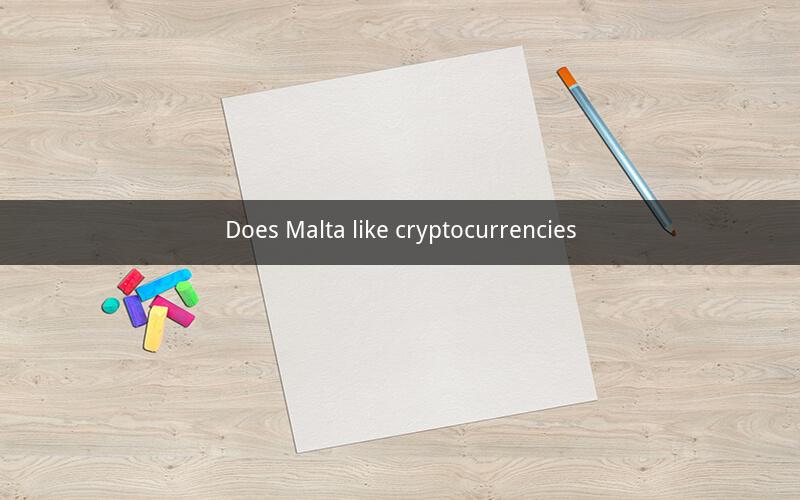
Table of Contents
1. Introduction to Cryptocurrencies
2. The Legal Landscape in Malta
3. Malta's Approach to Blockchain Technology
4. The Impact of Cryptocurrencies on Malta's Economy
5. The Role of Malta's Financial Institutions
6. The Future of Cryptocurrency in Malta
7. Conclusion
---
1. Introduction to Cryptocurrencies
Cryptocurrencies have emerged as a revolutionary financial technology, offering decentralized and digital alternatives to traditional banking systems. These digital assets are secured by strong cryptographic algorithms, ensuring secure transactions and ownership verification. With the rise of Bitcoin, the first and most well-known cryptocurrency, the world has witnessed a growing interest in digital currencies.
2. The Legal Landscape in Malta
Malta, a small island nation in the Mediterranean, has positioned itself as a global hub for cryptocurrencies and blockchain technology. Recognizing the potential of these technologies, the Maltese government has implemented favorable regulations to attract businesses and entrepreneurs in the sector. The introduction of the Virtual Financial Assets Act (VFAA) in 2018 marked a significant milestone, providing a comprehensive regulatory framework for cryptocurrencies and related services.
3. Malta's Approach to Blockchain Technology
Malta's approach to blockchain technology is characterized by a proactive stance. The government has established a favorable environment for the development and adoption of blockchain solutions across various sectors, including finance, healthcare, and supply chain management. The Malta Digital Innovation Authority (MDIA) was created to oversee the implementation of blockchain technology and ensure compliance with the VFAA.
4. The Impact of Cryptocurrencies on Malta's Economy
The introduction of cryptocurrencies and blockchain technology has had a positive impact on Malta's economy. The country has experienced an influx of foreign investment, with numerous blockchain startups and established companies choosing to establish their operations in Malta. This has contributed to job creation and the growth of the technology sector, enhancing Malta's reputation as a forward-thinking nation.
5. The Role of Malta's Financial Institutions
Malta's financial institutions have played a crucial role in the adoption and integration of cryptocurrencies. Banks and other financial service providers have embraced digital currencies, offering services such as cryptocurrency exchange, wallet solutions, and payment processing. This has facilitated the growth of the cryptocurrency market in Malta and provided users with a wide range of options for engaging with digital assets.
6. The Future of Cryptocurrency in Malta
The future of cryptocurrency in Malta looks promising. The government's commitment to fostering innovation and providing a stable regulatory environment continues to attract businesses and investors. As the technology evolves, Malta is well-positioned to become a leading player in the global cryptocurrency market, offering a platform for the development of new blockchain solutions and services.
---
7. Conclusion
Malta's embrace of cryptocurrencies and blockchain technology has positioned the nation as a global leader in the digital financial space. The favorable legal landscape, proactive approach to innovation, and the active participation of financial institutions have contributed to the growth of the cryptocurrency market in Malta. As the world continues to explore the potential of digital currencies, Malta is well on its way to solidifying its status as a hub for cryptocurrency and blockchain technology.
---
Questions and Answers
1. Q: What is the main advantage of cryptocurrencies over traditional banking systems?
A: Cryptocurrencies offer decentralized and secure transactions, eliminating the need for intermediaries and reducing transaction costs.
2. Q: How does the VFAA differ from other regulatory frameworks for cryptocurrencies?
A: The VFAA provides a comprehensive regulatory framework that covers various aspects of the cryptocurrency industry, including the issuance, trading, and storage of digital assets.
3. Q: What is the role of the MDIA in the development of blockchain technology in Malta?
A: The MDIA oversees the implementation of blockchain technology and ensures compliance with the VFAA, providing a regulatory framework for the industry.
4. Q: How has the introduction of cryptocurrencies impacted Malta's economy?
A: The introduction of cryptocurrencies has attracted foreign investment, created jobs, and enhanced Malta's reputation as a technology hub.
5. Q: Can traditional banks in Malta offer cryptocurrency services?
A: Yes, many traditional banks in Malta offer cryptocurrency services, including exchange, wallet solutions, and payment processing.
6. Q: What are the main challenges faced by the cryptocurrency industry in Malta?
A: The main challenges include regulatory uncertainty, market volatility, and the need for further technological development.
7. Q: How does Malta's approach to cryptocurrencies compare to other countries?
A: Malta's approach is one of the most progressive and welcoming, with a clear regulatory framework and a strong commitment to innovation.
8. Q: What is the future of blockchain technology in Malta?
A: The future of blockchain technology in Malta looks promising, with ongoing efforts to foster innovation and attract businesses in the sector.
9. Q: How can individuals get involved in the cryptocurrency market in Malta?
A: Individuals can get involved by registering with licensed cryptocurrency exchanges, purchasing digital assets, and engaging with the local blockchain community.
10. Q: What are the potential risks associated with investing in cryptocurrencies?
A: Potential risks include market volatility, regulatory changes, and the risk of losing funds due to security breaches or fraud.